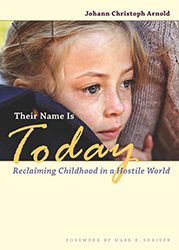“Children are not computers or robots that can be programmed according to our wishes; they have a heart and soul, not only a brain.” — Johann Christoph Arnold, author, Their Name Is Today
This month in the Patheos Book Club, we’re talking about an important new book called Their Name Is Today: Reclaiming Childhood in a Hostile World, by popular author and teacher Johann Christoph Arnold. In this interview, Arnold talks about his reverence for children — and his disdain for standardized testing, technology, overmedication, and forcing kids to grow up too fast.
You write that it’s time for a hopeful book about the state of childhood. What makes you so hopeful, in the face of all the major problems facing parents and teachers?
In my work with families, teachers, and schools, I encounter so many people that are giving everything they’ve got. The more hardships they encounter, and the more they are tested, the greater their resilience and courage grow. I draw my hope from that dogged spirit, that determination that “no matter what, the child comes first.”
 Can you explain the significance of the book’s title?
Can you explain the significance of the book’s title?
Gabriela Mistral was a Chilean poet, diplomat, and Nobel laureate. She cared deeply about children, and protested against the way they are so often ignored, undervalued, or exploited. The title of my book refers to my favorite poem by Mistral, “Su nombre es hoy,” where she expresses the thought, “Many things can wait. Children cannot…. Their name is today.”
Common Core Standards have been billed as the savior of our educational system. Why do you advocate so strongly against standardized testing?
Quantifying and measuring success belongs in the world of business. Children are not computers or robots that can be programmed according to our wishes; they have a heart and soul, not only a brain. We need to question the motives behind these measurements, which cannot take into account a child’s home life, and the difficulties he or she may be facing. If families and teachers were getting the support they needed, our country’s educational outcomes would improve drastically. Measurements and testing use up time and resources, they add tension and stress, and they don’t address the root of the problems children face.
We live in the great age of technology. Smartphones are an extension of our arms, and toddlers use tablets. Have our children benefitted?
No, technology can cause great harm to children. I know that’s a strong statement, and I’m not advocating that we go back to the stone age, but anyone who works with children can see that younger and younger children are glued to screens for more and more hours each day. There’s no debate that it affects their physical health: eyesight, hearing, and weight. But we also need to ask what it is doing to their souls.
Teachers and therapists are encountering children who struggle to communicate with human beings because they are only comfortable interacting with their phones. As I speak at high school assemblies around the country, I meet many teens who are lonely, unhappy, and confused about their own identity. Often these doubts arise because they’ve spent their lives creating online personas that are more glamorous, confident, and cool than any human can be. At a time when they need to be discovering their own strengths and powers, they are stuck between the real world and the virtual.
Two things you suggest children can never get too much of are unstructured free play and contact with the great outdoors. In your book, you explain that these concepts are something of a family heritage, going back to the inventor of the kindergarten. Can you describe that connection?
Friedrich Froebel, who created the concept of the kindergarten, was a nineteenth-century German educator whose greatest gift was his ability to view life through a child’s eyes. His educational philosophy makes sense to anyone who loves children today. When he coined the name “kindergarten,” he meant it literally – “a garden of children” – where each child is nurtured with the same love and care given to a seedling. He knew that humans are essentially creative and compassionate beings, and that education must involve the development of these traits.
On the importance of children’s play, he noted: “A child who plays thoroughly and perseveringly, until physical fatigue forbids, will be a determined adult, capable of self-sacrifice both for his own welfare and that of others.”
I have heard this quote all my life, as my mother, Annemarie, was Froebel’s great-great-grandniece. His school in the little German village of Keilhau was run by my mother’s family for many years, until the Nazis commandeered it. My mother kept the vision of Keilhau alive through the war years, as her family migrated from Germany to England, then to Paraguay, and eventually to the United States. Because of her commitment to her educational heritage, my own children and grandchildren and many others have benefited from Froebel’s approach. And we have seen that it works.
In Their Name Is Today, you describe your own childhood growing up in the developing world, and warn against the dangers of affluence. If toys and extracurricular activities are good, why aren’t more toys and activities better?
Toys, gifts, and activities may be meant as an expression of love. But they can burden and distract children, weighing them down with ownership and possessiveness, with a focus on having instead of being. Children don’t see material benefits in the same way adults do, at least, not until they’ve become used to overabundance! From my childhood in South America, I recall a visitor who asked me and my sisters if it was hard to live so simply. (He meant “in such poverty.”) Looking up at the stranger, I wondered if he was crazy. Hard? What on earth did he mean? I couldn’t imagine a happier childhood. But now I understand the foundation of our happiness.
Instead of things, my parents gave us time and attention on a daily basis. No matter how hectic their schedule, they tried to eat breakfast with us before we went off to school each morning. Though they worked long hours, they made a point of drawing us all in at the end of the day to gather and regroup. By today’s standards, we had nothing. But the love, patience, and guidance I received then have stayed with me my whole life.
Reverence is an old-fashioned word that keeps resurfacing in Their Name Is Today. What does having reverence for children mean to you?
I believe that at birth, all children bear the stamp of their Creator. Their purity and innocence is a great gift. Once it has been lost, it cannot be replaced. All the more, it must be guarded as a treasure which no one has a right to destroy. So many features of our “advanced civilization” attack the spirit of childhood. Be it materialism, overmedication, standardization, technological devices, or the debased sensationalism that passes for entertainment, all of it harms children.
Our response upon encountering a child must be nothing less than reverence. Perhaps because the word sounds old-fashioned, its true meaning has been blurred. Reverence is more than just love. It includes an appreciation for the qualities children possess (and which we ourselves have lost), a readiness to rediscover their value, and the humility to learn from them.
Read an excerpt – and more – from Their Name Is Today at the Patheos Book Club here.











